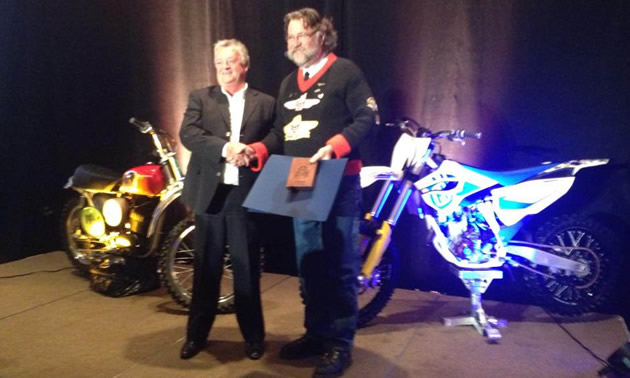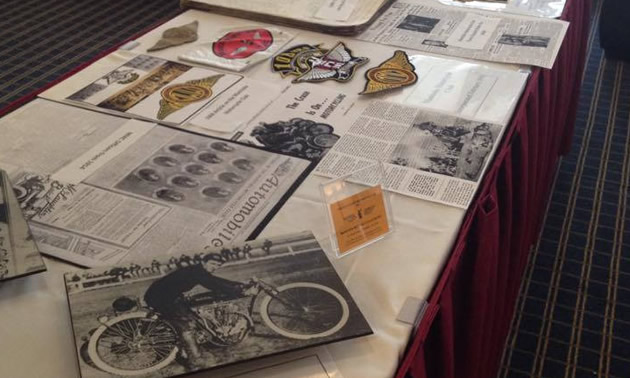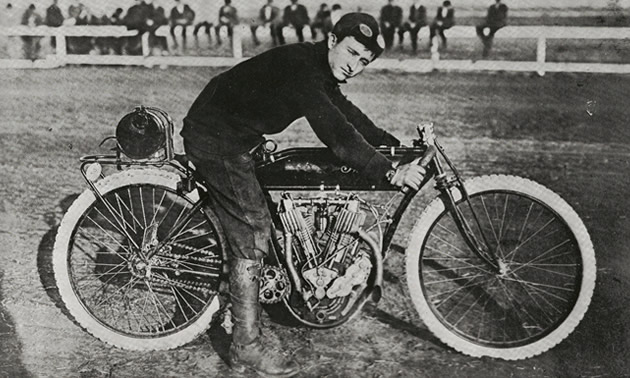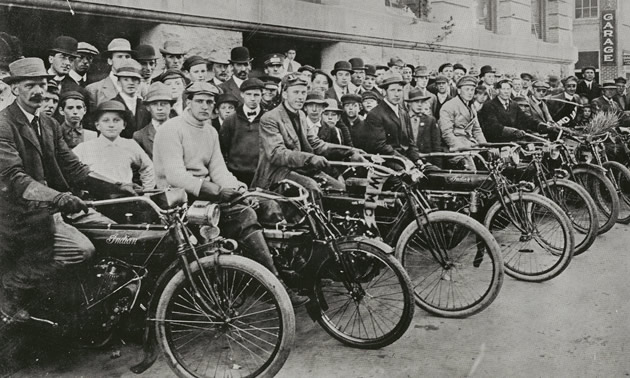Over 106 years ago, motorcycle enthusiasts in Winnipeg came together to create what would become a lasting legacy.
The Manitoba Motorcycle Club (MMC) was founded in January of 1911 and a lot has changed in the time since then. At the time, Winnipeg was the third largest city in Canada and was considered by many to be the "Chicago of the North."
Ross Metcalfe is the past president of the MMC and the Antique Motorcycle Club of Manitoba. He has also been a life-long member of the MMC and a curator of the club's lengthy history in Winnipeg.
"Back then, it was a hub, a transportation centre; it was thriving so when it's thriving, there's money in the pocket to buy sporting stuff," Metcalfe said. "The motorcycle club got started as a sporting club. By 1911, the MMC was part of the Canadian Motorcycle Association. It was just a few short years later that the Canadian championships were actually in Winnipeg."
The club, and Winnipeg, had built up quite a reputation in the early 1900s as a racing mecca.
"We had a very sophisticated race track here. Joe Baribeau was a world-champion racer; he was out of Winnipeg. There was some providence here with racers; the city was hustling and bustling and at the centre of all that was the Manitoba Motorcycle Club," Metcalfe said. "It controlled fun runs, reliability runs, racing; it was everything and anything to motorcycling. They were the ones who did it all in those days."

Ross Metcalfe, MMC president, receives the Canadian Motorcycle Hall of Fame 2014 inductee award. — Photo courtesy Manitoba Motorcycle Club
MMC through the ages
The MMC remained a strong voice for motorcycle culture for around 60 years, being heavily involved in training dispatch riders for both the First and Second World War. Manitoba was also ahead of its time, having prominent women riders involved in the club as well.
However, Metcallfe explained that things began to change for motorcycle groups in the late 1960s.
"Various organizations were starting up that focused on the different aspects of motorbikes, including motocross and hill climbing groups," Metcalfe said. "By the 1980s, the Manitoba Motorcycle Club became a social club, riding on Wednesday nights and having the odd run here and there, not the huge draw of membership from before."
The MMC was becoming smaller in number, not as prestigious as they once were in the last 30 years. By 2010, a major fire at the MMC's clubhouse prompted a significant change.
"In 2010, nigh on their 100th anniversary, the remaining members approached the Antique Motorcycle Club and I was one of the co-founders with 150 members," Metcalfe said. "The remaining membership were legally absorbed going into 2011. We changed the crest of the Antique Motorcycle Club of Manitoba. You'll see that it shows '100 years of motorcycling' as the MMC Antique Motorcycle Club of Manitoba."

Manitoba Motorcycle Club memorabilia is on display at the Canadian Motorcycle Hall of Fame 2014 inductee awards banquet. — Photo courtesy Manitoba Motorcycle Club
The MMC today
Metcalfe claims that the MMC was the go-to club for 60 years. Now, with a change in focus, it's prepared to remain an important part of motorcycle culture going into the future.
"If it's old motorcycles or history or nostalgia for motorcycling, we're it. We just shifted the focus," Metcalfe said. "It was all about the love of motorcycling in 1911. Well, it's still about the love of motorcycling. We just keep it in the concept of 30 years or older."
Today, there are around 20 motorcycle clubs in Manitoba alone. Metcalfe said what stands out about their group today is that it caters to the broader spectrum.
"You just have to like motorcycles to join. This particular club represents a ditch digger to a doctor. We have lawyers and doctors and gravediggers, at least two of them," Metcalfe said. "The common bond here is you love old motorcycles and you love motorcycles in general. That's the only criterion."
Despite global depressions, World Wars, fire and time, Metcalfe feels the MMC will always keep its place in the history of Winnipeg and the province as a whole.
"The Manitoba Motorcycle Club were tremendous and prominent people here; their social functions were legendary and were a going concern," Metcalfe said. "Now, we have something happening almost three times a week; we have major events and a rally that comes up in the third week of June."
For more information on the club and its regular events, go to www.amcm.ca.

Getting to know Joe Baribeau
As the Manitoba Motorcycle Club was getting its start, a prominent racer named Joe Baribeau called Winnipeg home and was beginning to take off.
Baribeau was known for setting a world record driving a motorcycle 100 miles on a dirt track in only 1 hour, 40 minutes and 14.6 seconds, beating the previous time by a margin of nearly two minutes.
While Baribeau's time is not in the record books today, at the time, it was a sensation.
Following his performance, Baribeau would move to Toronto in 1911, where he won a number of championships and even a new nicknames: "Daredevil Baribeau" or "The Terror on Wheels."
The First World War put a stop to race meets, leading Baribeau to return to Winnipeg with his wife and family. He was involved in the automotive trade in Winnipeg until he passed away at the age of 61 in 1950.








Comments